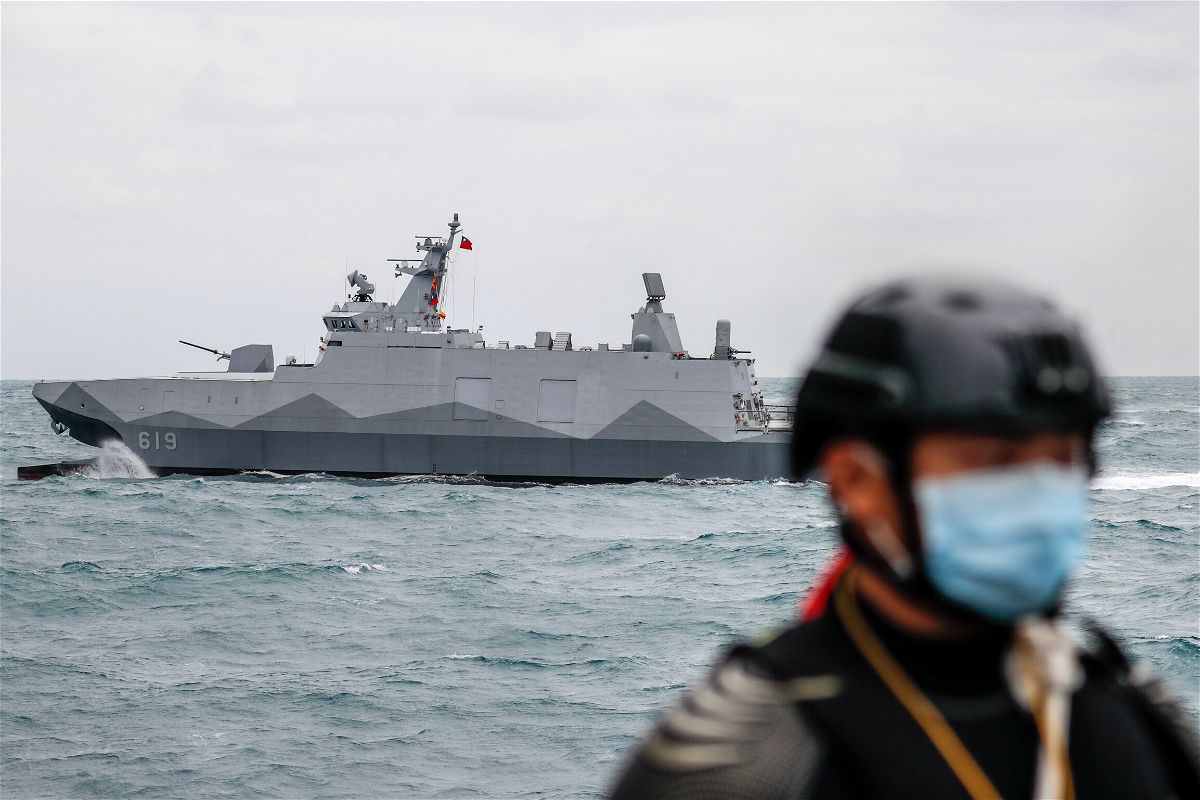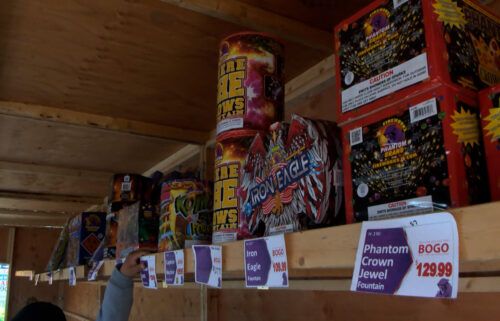What you need to know about China-Taiwan tensions

US President Joe Biden's warning the US would defend Taiwan against Chinese aggression has made headlines around the world and put growing tensions between the small democratic island and its neighboring autocratic superpower back under the spotlight.
By Jessie Yeung, Nectar Gan and Steven Jiang, CNN
US President Joe Biden’s warning the US would defend Taiwan against Chinese aggression has made headlines around the world — and put growing tensions between the small democratic island and its neighboring autocratic superpower back under the spotlight.
Less than a decade ago, ties seemed to be on the mend as the two sides — separated by a strait that is fewer than 80 miles (128 kilometers) wide at its narrowest point — deepened economic, cultural and even political engagements. But today, relations are at their lowest point in decades — raising fears of military escalation, even as experts caution that an imminent all-out war remains unlikely.
In recent months, China’s tacit support for Russia’s invasion of Ukraine has only fueled speculations over Beijing’s intentions with Taiwan, raising questions about how the world might react should China launch an attack.
Though the White House quickly downplayed Biden’s comments, no other country is as deeply intertwined in the dispute as the United States, which has a complicated history with both sides and has long trod a delicate middle path.
China’s authoritarian turn under leader Xi Jinping and plummeting relations with Washington have pulled Taiwan closer into the orbit of the US. This has infuriated Beijing, spurring it to unleash more pressure on Taiwan and sending cross-strait relations on a downward spiral.
Here’s what you need to know about the island increasingly at the forefront of US-China clashes.
First, a quick history
Taiwan, which has long been inhabited by indigenous peoples, became part of the Chinese empire in the 17th century. It was then ceded to Japan in 1895 after Imperial China lost the First Sino-Japanese War.
The island remained a Japanese colony for half a century until the end of World War II. Following the allied defeat of Japan, China’s ruling Nationalist government, led by the Kuomintang (KMT), took control of Taiwan.
Not long after, the Nationalists — which ruled the mainland under the Republic of China (ROC) banner following the fall of Imperial China — came under renewed attack from an insurgent Chinese Communist Party (CCP).
The two sides entered into a bloody civil war that resulted in the eventual defeat of the Nationalists who fled to Taiwan, moving the seat of the ROC government from Nanjing to Taipei. Across the strait, the CCP took power and established the People’s Republic of China (PRC) in Beijing.
Both proclaimed themselves the sole rightful government of the entire Chinese territory.
In Taipei, the Nationalist leader, Chiang Kai-shek, dreamed of one day retaking the mainland; In Beijing, CCP Chairman Mao Zedong deemed Taiwan the last piece to a united “new China” — a “problem” that needed to be solved sooner or later.
In recent years, Taiwan has downplayed its territorial claims over mainland China, and is today a vibrant democracy, with its own military, currency, constitution and elected government.
But it is not recognized as an independent country by most governments in the world, and has become increasingly isolated diplomatically.
Over the years, an increasing number of governments have switched their diplomatic recognition from Taipei to Beijing, leaving Taiwan with only 15 diplomatic allies at the end of 2021.
What’s the US’ role in all this?
During the Chinese civil war, the United States backed the Nationalists, while the Communists had support from the Soviet Union.
The US continued to support the KMT government after its retreat to Taiwan, providing it with development assistance to help build its economy, all the while shunning the PRC as an ideological and military adversary.
But following a diplomatic conflict between Beijing and Moscow in the 1960s — known as the Sino-Soviet split — relations between the PRC and the US began to thaw to counterbalance the Soviet Union.
By 1979, the US joined a growing list of nations to formally switch diplomatic recognition from Taipei to Beijing.
In what is known as the “One China” policy, Washington recognizes the PRC as the sole legitimate government of China; it also acknowledges Beijing’s position that Taiwan is part of China, but has never accepted the CCP’s claim of sovereignty over the island.
Meanwhile, the US continues to retain close unofficial ties with Taiwan under the terms of the decades-old Taiwan Relations Act, facilitating commercial, cultural and other exchanges through the American Institute in Taiwan (AIT) — the de facto US Embassy in Taipei.
Washington has also been supplying the island with defensive weaponry, but it has remained deliberately vague on whether it would defend the island in case of a Chinese invasion — a policy known as “strategic ambiguity.”
This is meant to keep a lid on the showdown by deterring China by keeping open the possibility of a US military response. At the same time, it’s aimed at depriving Taiwan of US assurances that could prompt it to declare official independence. The goal is to preserve the status quo and to avoid a war in Asia — and it has worked, allowing Washington to walk the tightrope of relations with both sides.
But under Biden, that “strategic ambiguity” has become somewhat less ambiguous. Since taking office, Biden has said on three occasions the US would be willing to intervene militarily should the Chinese attack — though the White House has rushed to walk back his remarks each time.
But his latest warning against Beijing carried extra symbolic weight — it was made right on China’s doorstep during his first trip to Asia as President, which is aimed at uniting allies and partners to counter China’s rising influence.
As expected, Beijing has reacted angrily to his remarks, expressing its “strong dissatisfaction and firm opposition” and accusing the US of “playing with fire.”
Why are tensions increasing?
For decades since the founding of the PRC, animosity reigned between Beijing and Taipei, with trade, travel and communication largely cut off. Military conflicts continued to flare up, with the PRC shelling several outlying islands controlled by the ROC on two separate occasions.
But tensions began to ease in the late 1980s, allowing limited private visits, indirect trade and investment across the strait. The ties reached a peak in 2015 during a historic meeting between the heads of the KMT and CCP in Singapore.
But relations deteriorated quickly after 2016, when Tsai Ing-wen from the traditionally pro-independence Democratic Progressive Party (DPP) won a landslide presidential election in Taiwan — propelled by concerns among voters that Taiwan was moving too close to Beijing under the KMT government.
And under Xi, China has become increasingly assertive in foreign policy and grown more authoritarian at home. Its relentless crackdown on democracy and freedoms in Hong Kong has further alienated many people in Taiwan, who fear they could face the same fate were they to be under Beijing’s rule.
Tensions are running especially high as the Chinese military ramps up its pressure on the island, in response to what Beijing sees as “provocations” by the administrations in Taiwan and the US.
How likely is conflict?
After aggressive military displays from Beijing in 2021, Taiwan’s Defense Minister warned that China would be able to mount a “full-scale” invasion of Taiwan by 2025 — prompting discussions on potential armed conflict.
The Chinese military maneuvers and drills are a reminder to Taiwan and the US not to cross Beijing’s red lines, said Bonnie Glaser, director of the Asia Program at the German Marshall Fund of the United States. She said those red lines include campaigning for formal Taiwan independence or a decision to deploy large numbers of US troops to the island.
In interview with CNN last year, President Tsai said the threat from Beijing was growing “every day.”
But on the streets of Taipei, the mood appears to be mostly relaxed and confident. And analysts agree that despite the rhetoric and the military saber-rattling, China is unlikely to invade Taiwan anytime soon.
US intelligence officials have also not yet seen anything to suggest that China is preparing a military offensive, according to people familiar with the assessments.
On Monday, Biden also echoed such assessment.
“My expectation is it will not happen,” he told reporters. “It will not be attempted.”
Aiming for a peaceful resolution to the standoff across the Taiwan Strait makes sense — experts have long said that any attempt by Beijing to forcefully take the island would be a hugely costly endeavor, with an uncertain outcome.
Moreover, the swift and coordinated response from the US and its allies to Russia’s invasion of Ukraine has likely alarmed Beijing, say experts, who suggest its leaders are watching Western reaction to Ukraine with Taiwan in mind.
It remains to be seen what lessons Beijing would draw from the Ukraine crisis — it could become more cautious in its calculation in light of Russia’s floundering invasion and the strong Western response.
But on the other hand, Beijing could also conclude that “any attempt to take the island by force will only get harder the longer they wait, as Taiwan may get more serious about its defense and the US and its allies may get more serious about preparing with Taiwan for that fight,” wrote Bill Bishop, an expert on Chinese politics and author of the Sinocism newsletter.
The-CNN-Wire
™ & © 2022 Cable News Network, Inc., a WarnerMedia Company. All rights reserved.
CNN’s Stephen Collinson contributed to this story.

